The Daily Bulletin is published by Internal and Leadership Communications, part of University Communications
Contact us at bulletin@uwaterloo.ca
Submission guidelines
Editor:
Brandon Sweet
University Communications
bulletin@uwaterloo.ca
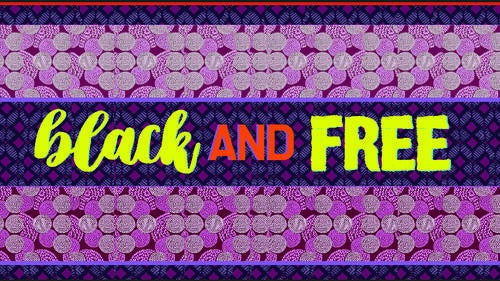
By Claire Francis. This article was originally published on Waterloo News.
“I think moving through this world is an expression of freedom because Black people are insistent on being here, on taking up space,” says Dr. Naila Keleta-Mae. “Our very being, the conversations we have, the ways in which we try to use our talents and time to care for one another — those are all expressions of Black freedom.”
Keleta-Mae’s research and teaching in Waterloo’s Theatre and Performance program (Department of Communication Arts) centres on notions of blackness and freedom as expressed through art and performance. A few years ago, she attracted media coverage for teaching a course on gender and performance centered on Beyoncé. Indeed, much of her work emphasizes Black women’s cultural production, including music, videos, performances, plays and poetry.
In 2017 Keleta-Mae began her Black And Free Research-Creation project that is now funded by the Social Sciences and Humanities Research Council, the Canada Council for the Arts, and the University of Waterloo. As both a scholar and artist she examines “what Black expressive cultures in North America and the Caribbean reveal about what it means to be Black and free in the 21st century.” She shares her work in a myriad of ways including in academic journals, on social media as well as op-eds in publications such as the Globe and Mail and Noisey. “My research and art can also be found in peer-reviewed books, streaming on music platforms and in poetry performances.”
Keleta-Mae reveals that inspiration for the project came during a spontaneous moment around her 40th birthday: “I'd been thinking a lot about what I wanted to spend my time and energy doing. I was posting [on Twitter] about blackness and freedom … and I think I said that I just wanted to spend the rest of my career and working, living days with blackness and freedom as my focus.”
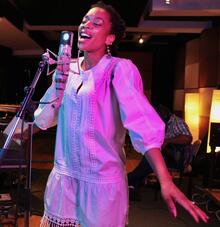 Now with an album, a poem, a play excerpt, a book chapter and articles on Black girlhood, Black women in Canadian theatre, and Black theatre in Zimbabwe all published under the Black And Free project, Keleta-Mae remains very conscious of the ways in which her art and research intersect. “Art comes first for me. It’s my vocation and so, I'm grateful for the ways in which the research is informing my art.” Supporting all angles of her work, from artistic to academic, are a host of innovative Black writers, thinkers and creators — from Audre Lorde, Katherine McKittrick and Donna P Hope to Christina Sharpe, Lorena Gale, Beryl West and of course, Beyoncé.
Now with an album, a poem, a play excerpt, a book chapter and articles on Black girlhood, Black women in Canadian theatre, and Black theatre in Zimbabwe all published under the Black And Free project, Keleta-Mae remains very conscious of the ways in which her art and research intersect. “Art comes first for me. It’s my vocation and so, I'm grateful for the ways in which the research is informing my art.” Supporting all angles of her work, from artistic to academic, are a host of innovative Black writers, thinkers and creators — from Audre Lorde, Katherine McKittrick and Donna P Hope to Christina Sharpe, Lorena Gale, Beryl West and of course, Beyoncé.
In another project branch, Keleta-Mae developed and teaches an Arts First undergraduate class called Black And Free that guides students through an examination of “how Black people have expressed their freedom in North America even in the midst of the violent institutionalized anti-Black racism that has plagued the continent for centuries.”
In late January, she was slated to offer a glimpse into her work through the performance of Black and Free: Research, Art, and Conversation via Facebook Live. However, due to technical difficulties, her American Sign Language (ASL) interpreter couldn’t appear onscreen.
Rejecting the old adage, the show must go on, Keleta-Mae immediately announced that her broadcast would be postponed until the ASL interpreter could be properly included.
In the weeks since that evening, Keleta-Mae remains deeply aware of the impact of her position. She sees her role as an educator as one who serves the public, “and that service includes putting together [our materials] and presenting it in ways that we have already learned that accessibility requires us to.” She continues, “If I am having this conversation about blackness and freedom but an entire demographic of Black people can't participate in that conversation, then I've failed before I've even started.”
Black freedom isn’t an abstract phenomenon, says Keleta-Mae. Away from the stage or classroom, the details of Black people’s lives demonstrate what’s possible — and regardless of our current crises, she remains hopeful.
“I want to believe that this is the moment. That we could seize obvious ways in which our imagination has had to stretch to meet this reality of being in a global pandemic. That we could have our imagination stretch and create a reality where white supremacy is over, and Black people are free.
“I think part of what that means for people who aren’t Black, and who care about this, is asking themselves questions like, 'What would my community, country and world look like if we really addressed concerns that Black people have raised for centuries? And what can I do to make that happen?'”
Keleta-Mae continues to reflect on what our current circumstance has revealed about humanity’s potential. “What this moment makes me think of, as someone who is committed to, dreams of and imagines Black people being free from anti-blackness in this lifetime is that we can imagine our world anew and do everything necessary to make it so. That we can live this long-overdue reality in our lifetime. That we can make all the necessary changes.”
Freedom is possible. What’s needed is a collective will to strive towards it.
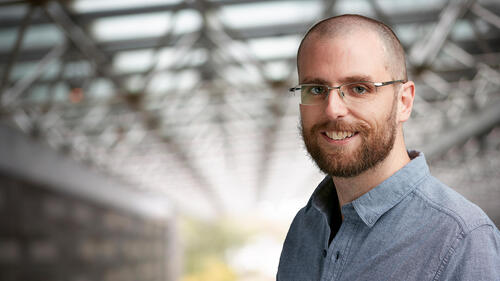
By Ryon Jones. This article was originally featured on Waterloo News.
Faculty of Mathematics Professor William Slofstra credits the University of Waterloo’s collaborative environment for him receiving a 2021 Sloan Research Fellowship. The pure mathematician is keen to use the monetary prize that comes with the fellowship to enhance the supportive atmosphere he has benefited from at Waterloo.
“It’s great to be recognized by the Alfred P. Sloan Foundation because I put a lot of work into my research,” says Slofstra, who is also a member of Waterloo’s Institute for Quantum Computing. “Receiving this fellowship is a recognition of the kind of environment that’s created at Waterloo where research is supported. It’s an environment where you can talk to other researchers, there’s time to do research, and great students to speak with about their work.
“What I’d like to do with this award is help to keep this environment going because that’s what creates the conditions for doing good research.”
The Sloan Research Fellowship, which has been awarded annually since 1955, honours U.S. and Canadian researchers whose creativity, innovation, and research accomplishments make them stand out as the next generation of scientific leaders.
Open to scholars in eight scientific and technical fields — chemistry, computational and evolutionary molecular biology, computer science, Earth system science, economics, mathematics, neuroscience, and physics — the Sloan Research Fellowships are awarded in close coordination with the scientific community. Candidates must be nominated by their fellow scientists and winners are selected by independent panels of senior scholars based on a candidate’s research accomplishments, creativity and potential to become a leader in their field. More than 1,000 researchers are nominated each year for 128 fellowship slots. Winners receive a two-year, $75,000 fellowship, which fellows can spend to advance their research.
“William is a rising superstar in the research community and I’m extremely pleased that the Sloan Foundation has recognized his enormous talent and potential,” says David McKinnon, chair of the Department of Pure Mathematics and the person who nominated Slofstra.
Professor Slofstra’s most significant research has been on the mathematical foundations of quantum information theory and especially the mathematics concerning the Tsirelson conjectures and the reformulation of the Connes Embedding Problem in terms of joint conditional probability densities.
Slofstra, in 2016, was the first to prove that some of Tsirelson’s mathematical models yielded different sets of joint quantum probability densities. He has also used his work to show the remarkable result that certain problems in quantum theory are undecidable. He did this by demonstrating that his constructions allowed him to reduce certain problems in quantum theory to the mathematics of groups of symmetries.
“Congratulations to William on being awarded a Sloan Research Fellowship,” says Mark Giesbrecht, Dean of Waterloo’s Faculty of Mathematics. “William’s work is already driving the research frontier and carrying the field of mathematics and mathematical physics forward.”
Slofstra's work has been continued by others, who have shown separations between other sets of joint quantum probability densities. A team of computer scientists in a lauded work in 2020 showed the last remaining pair of of Tsirelson’s mathematical models were distinct, resolving the Connes embedding problem.
Slofstra continues work on connections between the mathematics of groups of symmetries and Tsirelson’s problems.
By Jace Jaeden Ellis.
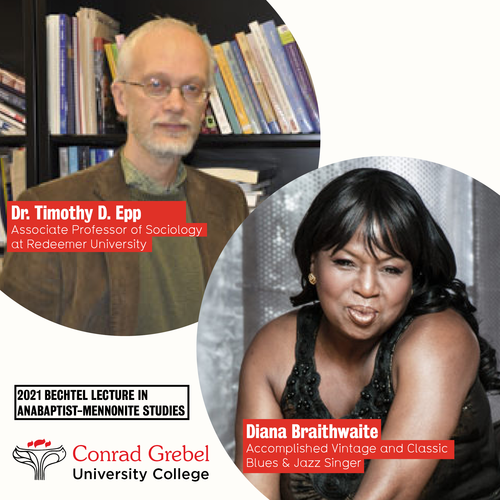 History, identity, faith, and culture. The Bechtel Lectures in Anabaptist-Mennonite Studies provide the opportunity for the community to get together and explore topics related to these four key themes in relation to Mennonites. Conrad Grebel University College is pleased to continue the annual tradition of hosting these presentations in a new virtual format. To support and celebrate Black History Month in Canada, the 2021 Bechtel Lecture, “Blackness, Whiteness and the Anabaptists ‘Imagined Community’ in Print and Mission”, will focus on the racialization of Anabaptists as reflected in print, social interactions, and mission activity.
History, identity, faith, and culture. The Bechtel Lectures in Anabaptist-Mennonite Studies provide the opportunity for the community to get together and explore topics related to these four key themes in relation to Mennonites. Conrad Grebel University College is pleased to continue the annual tradition of hosting these presentations in a new virtual format. To support and celebrate Black History Month in Canada, the 2021 Bechtel Lecture, “Blackness, Whiteness and the Anabaptists ‘Imagined Community’ in Print and Mission”, will focus on the racialization of Anabaptists as reflected in print, social interactions, and mission activity.
Grebel will welcome Professor Timothy Epp to present the virtual YouTube lecture, followed by an enlightening musical performance by Diana Braithwaite. Professor Timothy Epp is associate professor of Sociology at Redeemer University and is known for his many thought-invoking publications on Mennonites and blackness, as well as his deep research in relation to Anabaptists and racial identity. In addition, among Professor Epp’s broad range of research interests are the discourse of spirituality in popular music, and the concept of personhood in relation to dementia care. He has published a multitude of intriguing books, articles, and papers where he shares his vast knowledge on these subjects.
“Attendees to this year’s Bechtel Lecture in Anabaptist-Mennonite studies will undoubtedly find Dr. Timothy Epp’s presentation, stemming from many years of research, fascinating and illuminating,” said Professor Marlene Epp. “Conrad Grebel needs to encourage research and learning about Mennonite interactions with Black communities and about Mennonites’ own histories of racism.”
Diana Braithwaite is an internationally renowned jazz and blues vocalist who beautifully expresses life stories through her enchanting and unique blues style. She was born in Toronto as a descendant of the Wellington County pioneers in Canada, and growing up she spent her summers in a historic African-Canadian neighbourhood known as “Little Burgundy.” With her life experiences and passion to share stories with the world, Braithwaite has been recognized for her musical talents and has won both national and global music awards.
Through Braithwaite’s captivating life stories told by song and the illuminating words of Professor Epp, the community will learn the important history of blackness and Anabaptist racialization.
The event will premiere via YouTube on March 11 at 7:00 p.m. and is available to view without cost or registration. However, the virtual Q&A to follow the lecture will require registration in order to participate.
A message from the School of Optometry and Vision Science.
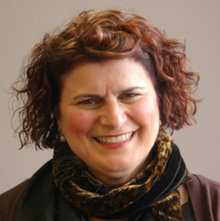 It is with sadness that the School of Optometry and Vision Science announces the passing of Dr. Gina Sorbara on February 10, 2021. She was surrounded by her loving family.
It is with sadness that the School of Optometry and Vision Science announces the passing of Dr. Gina Sorbara on February 10, 2021. She was surrounded by her loving family.
Dr. Sorbara was truly one of kind. Her spirit, passion and commitment to optometry were felt both here at the University of Waterloo and around the world. Staff, students and faculty are grateful to have had the opportunity to honour Gina and her indelible legacy during the celebration of her retirement last year. She has had an extraordinary impact on all those who were lucky enough to know her; she will truly be missed.
Due to the pandemic, there will not be a public funeral service. Gina’s family has requested that in lieu of flowers, donations can be made in her honour to either the Canadian Cancer Society or the School of Optometry & Vision Science.
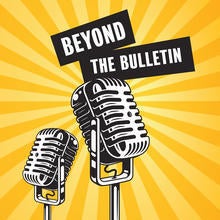
The latest episode of the Beyond the Bulletin Podcast is now live. Professor John Hirdes from the Faculty of Health led a study that checked in with Canadians several times during the early months of the pandemic, and it yielded some surprising results about our mental health—and whose is hardest hit. As the Region of Waterloo returns to the red zone, we provide updates on campus activity. The Global Impact Report reveals ways our students, faculty and alumni are responding to global challenges. And the President’s Anti-Racism Taskforce will host a special event to mark Black History Month.
Students can visit the Student Success Office online for supports including academic development, international student resources, leadership development, exchange and study abroad, and opportunities to get involved.
Instructors can visit the Keep Learning website to get support on adapting their teaching and learning plans for an online environment.
Updated Course templates are now available within your course in LEARN to help you build and edit your content and assignment pages quickly. Support for Winter 2021 is available.
The following workshops, webinars, and events are offered by the KL team (CTE, CEL, ITMS, LIB):
Independent Remote Course Design Essentials. Self-directed, continuous self-enrollment course in LEARN.
Learning from Our Remote Teaching Experiences (CTE7009), Tuesday, February 23, 1:00 p.m. to 2:30 p.m.
Introduction to Assessments in PebblePad (ATLAS) (CTE7512), Monday, March 8, 2:00 p.m. to 4:00 p.m.
Employees can access resources to help them work remotely, including managing University records and privacy of personal information. Here are some tips for staying healthy while working from home.
Stay informed about COVID cases on campus by consulting the COVID case tracker.
Whether you’re a student or faculty member, the Writing and Communication Centre has virtual services and programs to help you with all of your academic writing needs. This term we have added evening and weekend one-to-one appointments with our peer tutors, and our NEW one-to-one workshops, where you can learn the content directly from one of our writing advisors.
Co-op students can get help finding a job and find supports to successfully work remotely, develop new skills, access wellness and career information, and contact a co-op or career advisor.
The Centre for Career Action assists undergraduates, graduate students, postdocs, staff, faculty, and alumni through navigating career services that are right for them. You can attend a one-on-one appointment or same day drop-in session at the CCA for assistance with cover letter writing, career planning and much more. You can also book an appointment online or visit our Live Chat to connect with our Client Support Team. The CCA is here to help you.
You may need to speak with someone for emotional support. Good2Talk is a post-secondary student helpline based in Ontario, Canada that is available to all students. If you feel overwhelmed or anxious and need to talk to somebody, please contact the University’s Campus Wellness services, either Health Services or Counselling Services. You can also contact the University's Centre for Mental Health Research and Treatment.
The Library has published a resource guide on how to avoid information overload.
The Faculty Association of the University of Waterloo (FAUW) continues to advocate for its members. Check out the FAUW blog for more information.
The University of Waterloo Staff Association (UWSA) continues to advocate for its members. Check out the UWSA blog for more information.
The Indigenous Initiatives Office is a central hub that provides guidance, support, and resources to all Indigenous and non-Indigenous campus community members and oversees the university Indigenization strategy.
The Waterloo Indigenous Student Centre, based at St. Paul’s University College, provides support and resources for Indigenous students, and educational outreach programs for the broader community, including lectures, and events.
WUSA supports for students:
Peer support (Visit https://wusa.ca/peersupport to book an appointment):
Bike Centre – Will be reopening soon. Check https://wusa.ca/bikecentre for current operating times.
Campus Response Team, ICSN, Off Campus Community and Co-op Connection all available online. Check https://wusa.ca for more details.
Food Support Service food hampers are currently available from the Turnkey Desk on weekdays from 7:30 a.m. to 7:00 p.m. in the Student Life Centre. If you have any questions please email us at foodsupport@wusa.ca.
Centre for Academic Policy Support - CAPS is here to assist Waterloo undergraduates throughout their experience in navigating academic policy in the instances of filing petitions, grievances and appeals. Please contact them at caps@wusa.ca. More information at https://wusa.ca/services/centre-academic-policy-support-caps.
WUSA Commissioners who can help in a variety of areas that students may be experiencing during this time:
WUSA Student Legal Protection Program - Seeking legal counsel can be intimidating, especially if it’s your first time facing a legal issue. The legal assistance helpline provides quick access to legal advice in any area of law, including criminal. Just call 1-833-202-4571.
Empower Me is a confidential mental health and wellness service that connects students with qualified counsellors 24/7. They can be reached at 1-833-628-5589.
Healthy Warriors at Home. Free programming including Online Fitness, Health Webinars, Personalized Nutrition and more from Warriors Athletics and Rec. Open to students, staff, faculty and alumni. Register today.
Livestream Exercises for Waterloo staff: Join us for an energy boosting Bootcamp or a fast and effective Express Home Workout! Open to UW Staff and subsidized by the Staff Excellence Fund.
Renison English Language Institute continues to offer virtual events and workshops to help students practice their English language skills.
Warriors vs. Laurier Blood Donation Battle. Join your fellow Warriors, donate blood and help us win the Blood Battle against Laurier for a second year in a row. Set up a profile or add the PFL code: UNIV960995 to your account if you have a blood.ca account already. Questions? Contact WarriorsInfo@uwaterloo.ca.
Warrior Rec Free Programs for Students, January to February. Wide range of free opportunities available to keep students active and healthy including:Fitness Classes (On-Demand), Health and Mindfulness Webinars, Personalized Nutrition Guides, Personal Training Consultations, Small Group Training and Warrior Reset. Register today.
Drop-in to Warrior Virtual Study Halls on Wednesdays from 5:30 p.m. to 7:00 p.m. Come together in this virtual space to set goals and work independently or in groups each week.
Warriors truLOCAL Kickback Program, January 20 to February 20. Support your Warriors varsity teams by purchasing a pre-set truLOCAL box filled with the best quality locally sourced meat and fish. Find out more information and purchase a box today.
Reading Week, Saturday, February 13 to Sunday, February 21.
IT Seminar: IST-ITMS’s 2020, the year of “living in interesting times”, Friday, February 19, 9:00 a.m. to 9:45 a.m. Join online.
Quest downtime, Saturday, February 20 to Monday, February 22, 8:30 a.m.
Senate meeting, Monday, February 22, 3:30 p.m.
WaterLeadership: Write it up: Practical tips for communicating your research, Tuesday, February 23, 12:00 noon to 1:30 p.m.
GEDIx: A 30-minute Exchange, Tuesday, February 23, 1:00 p.m.
Concept Working Session: Customer Discovery, Tuesday, February 23, 5:30 p.m., virtual event.
Noon Hour Concert: Schumann’s Symphonic Etudes Op. 13, Wednesday, February 24, 12:30 p.m.
The Daily Bulletin is published by Internal and Leadership Communications, part of University Communications
Contact us at bulletin@uwaterloo.ca
Submission guidelines
The University of Waterloo acknowledges that much of our work takes place on the traditional territory of the Neutral, Anishinaabeg, and Haudenosaunee peoples. Our main campus is situated on the Haldimand Tract, the land granted to the Six Nations that includes six miles on each side of the Grand River. Our active work toward reconciliation takes place across our campuses through research, learning, teaching, and community building, and is co-ordinated within the Office of Indigenous Relations.